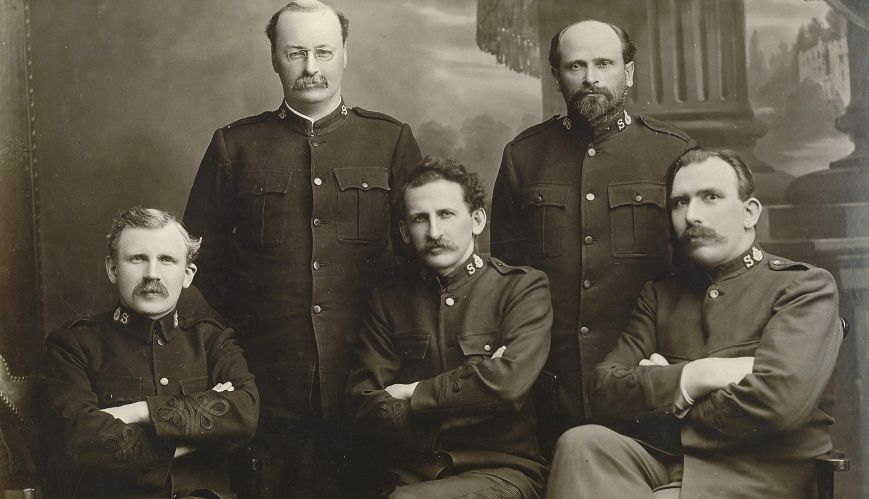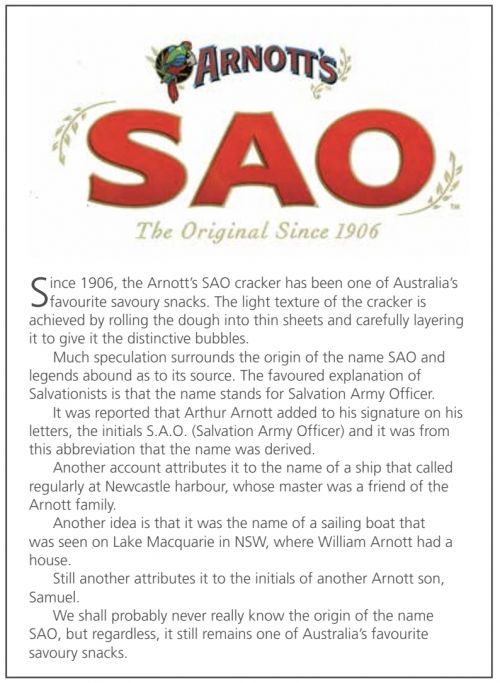The man of many faces

The man of many faces
‘The Saveloy Club’ was the name given to this influential group of territorial headquarters officers who met regularly for lunch. (From left): John McMillan, later to become the Chief of the Staff; Arthur Arnott, songwriter and fundraiser, George Carpenter, later to become the Army’s fifth General, Walter Suttor; later to become the Chief Secretary in the Australia Eastern Territory, and William McKenzie, famed as ‘Fighting Mac’ Anzac Padre.
Arthur Smith Arnott – son of the legendary biscuit maker and pioneer Salvation Army officer William Arnott – was to forge for himself a significant place in Australia's Army history
Arthur’s father, William Arnott, emigrated to Australia with his brother David from Scotland, where they had been apprenticed to a baker and confectioner. Arriving on the Sir Edward Parry on 17 February 1848, they joined their family in the Maitland area and worked as bakers and pastry cooks.
In 1894, William purchased a factory in Sydney, and the biscuit maker was to go on and build a company, which became one of the great icons of Australian industry.
A committed and sincere Christian, William was active in the Wesleyan Church. No doubt it was this heritage that influenced the young Arthur Smith Arnott in his search for God. This search for God led Arthur to a park in North Sydney in 1893 to listen to a group of Salvationists holding an open-air meeting.
There was no doubt that Arthur stood out among the crowd of listeners that day. Tall, handsome and well-dressed, he spoke with the corps treasurer, who engaged him on the fringe of the meeting in a cultured and well-educated manner. This conversation was followed by a dinner invitation from the corps treasurer and a meeting with an officer.
It was at the treasurer’s home that Arthur Arnott committed his life to Christ. It was to be a decision that not only changed his life forever but was to have a significant impact on The Salvation Army. Never one to do things by half measures, the following day, Arthur made his way to Salvation Army headquarters in Sydney and purchased a complete uniform, which he immediately put on and wore to his place of business.
As manager of his father’s biscuit factory in Forest Lodge, Sydney, Arthur lost no time declaring his newfound faith to his employees, often witnessing to them and holding prayer meetings at the factory.
Fundraising ability
The call to officership in the Army began to exercise Arthur’s mind. It was during the conversion of a young man to whom he had been witnessing that this call was confirmed.
Following training, Arthur was appointed to the Field Department at Territorial Headquarters; however, soon afterwards, he was appointed as the private secretary to the Army’s dynamic leader, Commandant Herbert Booth.
During his time as secretary to Commandant Booth, Arthur’s ability as a fundraiser became obvious, having been given the responsibility to raise funds for the new training garrison in Melbourne. Arthur’s philosophy on fundraising became sacramental to him and was based on good theological common sense. He was reported to say: “Christ bids us feed the hungry and clothe the naked; it cannot be done without money. He bids us go to all the world and preach the Gospel to every creature; it needs money to do this. Therefore, raising money is an essential part of the work of the kingdom.”

In 1904, Arthur married Ensign Lucy Tucker, a cultured young woman from New Zealand. She was to become his greatest supporter. Two daughters, Margaret and Florence, soon completed the Arnott household. It would appear that home life was at times a little chaotic.
One of his daughters was heard to comment to her mother when Arthur was missing: “Well, mum, he’s either in the commissioner’s office or chasing a drunk.” When Arthur found the “drunks”, they were more often than not accommodated in the Arnott’s tiny two-bedroom quarters.
Arthur Arnott was to become a pivotal member of a group of officers which included George Carpenter (later to become the Army’s fifth general) and Gallipoli chaplain William McKenzie (known as Fighting Mac), who was to not only influence The Salvation Army in coming years but also to lead it.
Commissioner James Hay spoke of him as “a humble man with big ideas – the essence of humility and service to the least, yet possessed with the most expansive ideas of the place of the Army, the work it could do, the impressions it could make and the forces it could release that would travel on through the centuries”.
Heart for children Arthur Arnott was a multifaceted man. His love and use of music were to stamp him as one of the leading Salvation Army composers of his day. His participation in arranging young people’s demonstrations over 30 years provided him with the platform necessary to demonstrate his great songwriting skills. Some songs, like ‘Tell Them in the East and in the West’, have become firm favourites and survive in the current Song Book of The Salvation Army (song 829).
Arthur’s love for children and the work among them was to become legendary. A centennial salute to pioneers in The War Cry of 24 May 1980 commented: “Arnott’s message was typical of the man. As always, he made Jesus seem so real and so near that even the smallest child might touch him.”
His visits to children’s homes and his fundraising activities to build and support such establishments were to mark him out as an officer who clearly comprehended the eternal value of a child. Arnott and his wife retired to the Melbourne suburb of Thornbury, where they supported the local corps.
Even in retirement, Arthur was active in seeking souls for God’s kingdom, often visiting local dance halls to give a brief message and an invitation. Colonel Arthur Smith Arnott was promoted to glory on 1 May 1941.
Those to whom he had ministered did not fail to appreciate this service, and when news of his passing was received at the local dance hall, dancers stood for two minutes’ silence – a tribute to a man who loved their souls.